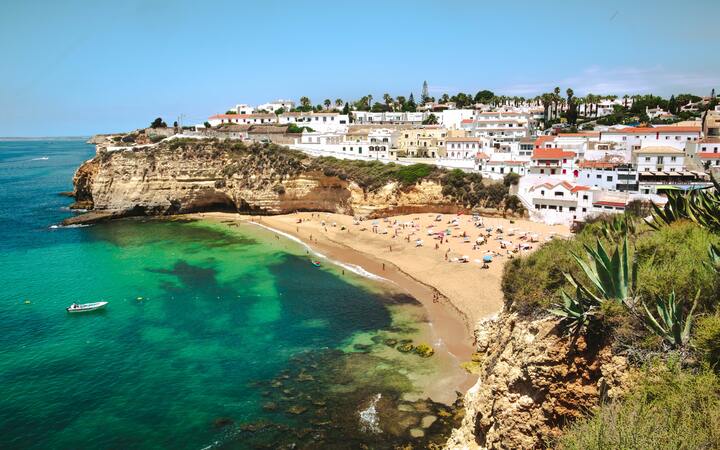Acquiring Portuguese citizenship through the descendants of Sephardic Jews of Portuguese origin
Portuguese Sephardic citizenship
Sephardim is an ethnographic group of the Jewish people that originated on the Iberian Peninsula and in North Africa as a result of the migration of Judeans within the Roman Empire and later within the Caliphate.
The term Sephardic derives from the word "Sefarad," which means "Spain" in Hebrew. However, nowadays this term is used to refer to the descendants of Jews who left the Iberian Peninsula due to the Reconquista in the 15th century, as well as those who left at a later time.
Historical Background
After the completion of the Reconquista in 1492, hundreds of thousands of Spanish-speaking Jews who refused to convert to Christianity were expelled from Spain, and in 1497, from Portugal as well. Those who remained were forced to convert to Christianity. However, despite their conversion, they were not considered loyal citizens and did not have equal opportunities with the general population. As a result, a significant portion of these "New Christians" left the Iberian Peninsula in the 17th century, choosing to settle in overseas colonies and other European countries. Sephardim who settled in Protestant countries and territories renounced the imposed Christianity and returned to their ancestral faith.
Throughout the 19th century, the term "Sephardic" was used to refer to all Jews who did not have Ashkenazi origins (German, Central European, or Russian descent). Thus, this classification included not only Jews of Iberian Peninsula origin but also those with Arab origins, as well as Persian, Georgian, Armenian, Yemenite, and even Indian origins.
During World War II, the Sephardic global community experienced a sharp decline. Many of its members were dispersed and rapidly emigrated, mostly to Latin American countries. Additionally, the Holocaust resulted in the loss of a significant number of European Jews, including Sephardim.
Today, the Sephardic community numbers 2 million individuals, with the majority residing in Israel, France, the United States, Argentina, and Canada.
The near destruction of the entire Sephardic community during the Holocaust prompted its members to actively engage in preserving the culture and language of this segment of the Jewish people. Active advocates emerged, and in the United States, the Foundation for the Advancement of Sephardic Studies and Culture (FASAAC) was established. Consequently, there was an increasing focus on the representatives of the community in the countries of the Iberian Peninsula.
Relations between Spain and the Sephardic community strengthened throughout the 20th century, seeking to rectify the consequences of the persecutions suffered by Sephardic Jews starting from the 15th century.
Since 1982, Spain has been granting recognition of citizenship to Sephardic Jews who can establish a connection to the country. In mid-2015, the so-called "Sephardic Law" (officially Law 12/2015) was enacted, which approved the granting of Spanish citizenship to individuals who could prove their Sephardic ancestry through a series of requirements, verification in existing records, and authentication conducted by the Federation of Jewish Communities. Although the law was criticized for its complexity compared to similar laws like the Portuguese one, and the length of processing and requirements (which initially included two trips to Spain), out of approximately 239,000 applications submitted during the duration of this law (from June 2015 to October 2019), by the end of 2022, 64.7 thousand individuals were granted citizenship under this law.
Citizenship for Sephardic Jews in Portugal
Portugal has also enacted a similar law, but without a specified deadline for citizenship applications. Section 7 of Article 6 of the Nationality Law allows for the acquisition of citizenship by descendants of Portuguese Sephardic Jews.
The Parliament of Portugal approved Organic Law No. 1/2013 on July 29, which establishes the possibility of granting Portuguese citizenship to descendants of Sephardic Jews who were forced to leave Portugal starting from the 15th century. Finally, on March 2, 2015, Decree-Law No. 30-A/2015 of February 27 came into effect, solidifying this possibility.
This acquisition of citizenship, obtained through the naturalization of foreign citizens who are descendants of Sephardic Jews, requires a demonstration of "a tradition of belonging to the Sephardic community of Portuguese origin based on objective and proven requirements
Requirements for Applicants
- Portuguese citizenship through the acquisition procedure can be obtained by descendants of Portuguese Sephardic Jews or members of Sephardic community of Portuguese origin who have reached the age of 18 or is emancipated according to Portuguese law.
- It is necessary to provide proof of the absence of convictions for crimes punishable by imprisonment for a period exceeding three years according to Portuguese law.
- Not being involved in activities related to terrorism.
- The application can be submitted by the interested party in person or by their representative. If the applicant is represented by a legal representative, the power of attorney must be duly executed according to the law. If the application is submitted by the interested party in person, the application must be signed:
-
in the presence of a Registry employee during the submission of the application;
-
in the presence of a person authorized to recognize/attest the signature if you wish to send the application by mail to one of the citizenship offices or to the Central Registry - Rua Rodrigo da Fonseca, 198. 1099-003 Lisboa.
-
List of Required Documents for Portuguese Sephardic citizenship
Therefore, descendants of Portuguese Sephardic Jews can apply for Portuguese citizenship by submitting the following documents:
1) A request addressed to the Minister of Justice, written in Portuguese, which includes:
А) Full name, date of birth, name of the parents, marital status, citizenship, nationality, ancestry, profession, the country(ies) where you lived and current place of residence;
B) Circumstances establishing affiliation with the Portuguese Sephardic community:
– Family surname;
– Language spoken within the family (e.g., Ladino);
– Direct lineage (son, grandson, great-grandson, etc.) or collateral family relationships (uncles, cousins, etc.) from a common ancestor of Portuguese Sephardic origin.
Examples of surnames that may indicate Sephardic origin for Portuguese Sephardic citizenship:
Abrantes, Aguilar, Andrade, Brandão, Brito, Bueno, Cardoso, Carvalho, Castro, Costa, Coutinho, Dourado, Fonseca, Furtado, Gomes, Gouveia, Granjo, Henriques, Lara, Marques, Melo e Prado, Mesquita, Mendes, Neto, Nunes, Pereira, Pinheiro, Rodrigues, Rosa, Sarmento, Silva, Soares, Teixeira e Teles, Almeida, Avelar, Bravo, Carvajal, Crespo, Duarte, Ferreira, Franco, Gato, Gonçalves, Guerreiro, Leão, Lopes, Leiria, Lobo, Lousada, Machorro, Martins, Montesino, Moreno, Mota, Macias, Miranda, Oliveira, Osório, Pardo, Pina, Pinto, Pimentel,Pizarro, Querido, Rei, Ribeiro, Salvador, Torres e Viana, Amorim, Azevedo, Álvares, Barros, Basto, Belmonte, Cáceres, Caetano, Campos, Carneiro, Cruz, Dias, Duarte, Elias, Estrela, Gaiola, Josué, Lemos, Lombroso, Lopes, Machado, Mascarenhas, Mattos, Meira, Mello e Canto, Mendes da Costa, Miranda, Morão, Morões, Mota, Moucada, Negro, Oliveira, Osório (або Ozório), Paiva, Pilão, Pinto, Pessoa, Preto, Souza, Vaz, Vargas.
C) Full name, identification number, and address of your legal representative or authorized person, if applicable;
D) Number, date, and issuing authority of the residence permit, passport, or any other identification document.
The following documents must be attached to the application:
2) Birth certificate of the applicant with the full text (if the applicant is a minor) or a photocopy of the original birth certificate in the file (if the applicant is of legal age), in both cases issued within the last six months and legalized by the Hague Apostille. After legalization, the certificate must be translated into Portuguese and duly legalized. If the documents have a digital signature, they must be printed at the time of application. The certificate may not be required if the birth was registered in a Portuguese civil registry office, and the registry office, year, and registration number can be identified.
3) Certificates of no criminal record from Portugal, the country of birth/citizenship, and the countries where the applicant has resided since the age of 16 or currently resides (all certificates issued by foreign authorities must be certified and legalized at a Portuguese consulate accredited in the issuing country, and if issued in a foreign language, they must be accompanied by a certified translation);
4) Certificate from the Jewish community based in Portugal stating that the interested person belongs to the Portuguese Sephardic community, with attributes such as the applicant's family surname, language spoken within the family, genealogical tree, and family memories. This certificate must include the full name, date and place of birth, nationality, ancestry, citizenship, and full address of the interested person, as well as indicate direct lineage or collateral family relationships from a common ancestor of Portuguese Sephardic origin, along with a genealogical tree and supporting documents.
5) In the absence of the certificate mentioned in item 4 and to confirm direct lineage or collateral family relationships from a common ancestor of Portuguese Sephardic origin and the tradition of belonging to the Portuguese Sephardic community, the following means of proof are accepted:
(a) A certified document issued by the Jewish community to which the applicant belongs (in the country of origin), attesting to the use of Portuguese expressions in Jewish rituals or the use of Ladino language for communication within that community;
(b) Certified documentary records, such as synagogue and Jewish cemetery registers, as well as residence registration certificates, property rights, wills, genealogical studies and other evidence of direct lineage or collateral family relationships from a common ancestor of Portuguese Sephardic origin.
6) In case of doubts about the authenticity of documents issued abroad, the Portuguese Ministry of Justice may consult the Portuguese Jewish community mentioned in item 4 to express their opinion on the evidence provided in accordance with the previous provision.
7) Proof of residence - the most recent confirmations, such as water, electricity, telephone, internet, cable television bills, etc., issued in the name of the applicant or their spouse/parents.
8) Original identification document of the applicant (in good condition and issued less than 10 years ago) and a properly certified photocopy;
9) Proof of payment of 250 euros (the amount may vary).
Document Submission for obtaining citizenship
If you have collected the complete package of documents, including those requiring legalization, you can submit your application in the following ways:
- At the National Immigration Support Center in Lisbon.
- At the National Immigration Support Center in Porto.
- At the Citizenship Department of the Central Archives of the City of Porto.
- At the Citizenship Department of other city's Regional Civil Registration and Notary Services in Portugal.
- At the Central Department of Civil Registry Acts (Lisbon).
- At the Departments of Civil Registry Acts.
- At the Departments of Registry in Campus de Justiça and Benfica.
- At the Citizen's Shop in Odivelas.
- At the Embassy or Consulate of Portugal based on your place of residence.
If you wish, you can also submit the application by mail.
If you are represented by a lawyer or advocate registered with the respective orders in Portugal when submitting an application for Portuguese citizenship, you can submit the documents online through the corresponding service of the Ministry of Justice of Portugal.
Individuals who acquire citizenship through this process are considered Portuguese citizens from the moment citizenship is granted.





